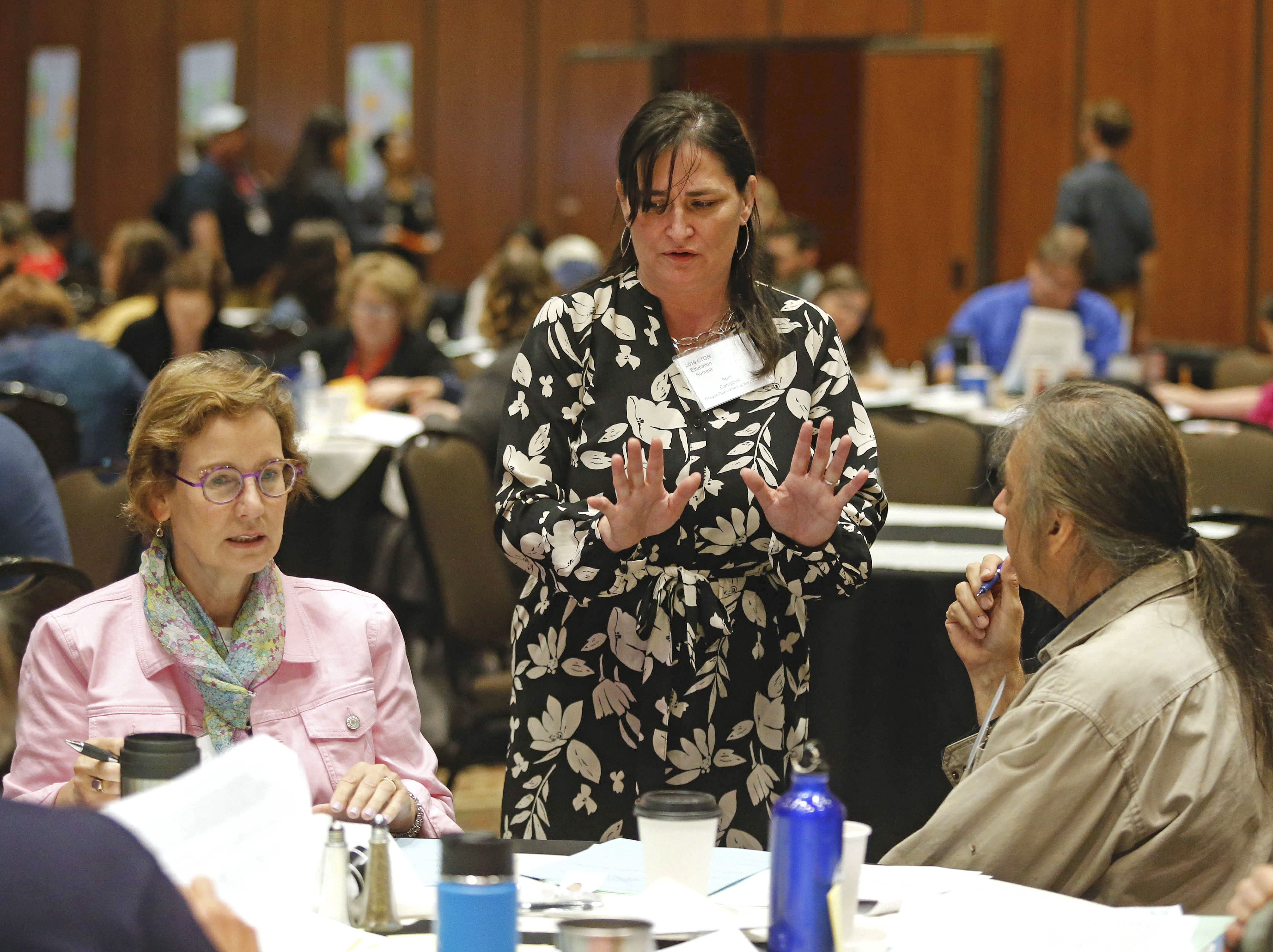Health & Education
Education Summit focuses on state's Native American curriculum

By Danielle Frost
Smoke Signals staff writer
Approximately 200 educators from two different states filled the meeting rooms at Spirit Mountain Casino for the third annual Grand Ronde Education Summit held on Monday and Tuesday, June 24-25.
Teachers from all grade levels came to learn more about the Grand Ronde Tribe, how to create meaningful Native American curriculum and how to teach new standards required by Oregon’s Senate Bill 13.
Acting Education Department Manager Bryan Langley welcomed attendees to the event along with Tribal Council member Steve Bobb Sr.
Cultural Advisor Bobby Mercier, Tribal youth Nokoa Mercier and Cultural Education Coordinator Jordan Mercier opened the summit with a drum song.
The summit has continued to increase in popularity among educators, increasing from 90 attendees the first year to 200 in the third year.
The primary focus the first morning of the summit was Senate Bill 13, which required the Oregon Department of Education to develop curriculum relating to the Native American experience in Oregon. This includes Tribal history, sovereignty, culture, treaty rights, government, socioeconomic experiences and current events.
Curriculum was developed during the past year by a committee and will be implemented in school districts for required teaching in the 2019-20 school year to students in the fourth, eighth and 10th grades.
The committee included 18 representatives from Oregon’s nine federally recognized Tribes, led by Portland-based Education Northwest Consultants, a nonprofit organization that worked with the Department of Education to support implementation of Senate Bill 13.
Education Northwest Practice Expert Mandy Smoker-Broaddus and Shoreline Consulting Event Facilitator Shadiin Garcia updated educators about the Essential Understandings of Oregon Native Americans curriculum.
“These Essential Understandings are a collection of heart, expertise and knowledge,” Garcia said.
Grand Ronde Tribal member and State Indian Education Advisor April Campbell interacted with attendees who discussed their understanding of topics such as sovereignty, time immemorial, lifeways, history, Tribal government, identity, language, treaties and genocide.
Smoker-Broaddus said educators at the conference were the first ones to interact with the curriculum.
“I’m very excited about this,” she said. “You are the first group outside of the Nations to have this in your hands.”
After the morning session concluded, educators attended breakout sessions with Grand Ronde Curriculum Specialist and Academic Adviser Mercedes Jones or Coos, Lower Umpqua, Siuslaw Indians Tribal Culture Director Jesse Beers, or took a guided tour of Chachalu Museum & Cultural Center.
Jones focused on the history of the Tribe and development of Grand Ronde Tribal curriculum in local schools.
“Our kindergarten through 12th-grade population in Oregon has become more and more diverse,” she said. “That means we need to be mindful about the methods we use and what we are teaching. We have to give kids things to identify with.”
One of the projects Tribal educators completed with Senate Bill 13 funding was to create several children’s books that tell traditional Grand Ronde Tribal stories that teachers can use in their classrooms. The books are free and can be obtained by contacting the Tribal Education Department.
Tuesday morning sessions included a presentation on sovereignty from Grand Ronde Tribal Attorney Jennifer Biesack, Native plant nurseries with Jordan Mercier and Native Plant Nursery Supervisor Jeremy Ojua, connecting with Native families by Family Services Coordinator Audra Sherwood, federal Indian policy, and Cow Creek and Umatilla Tribal history.
“The greatest success in children’s lives is getting the parents on board,” Sherwood said. “No matter what has happened, that kiddo is seeking their parents’ approval.”
Sherwood often works with families who have students on special educational plans at school.
“No matter where that family has been, we need to remember that they have value,” she said. “Try to put yourself in the position of what in your own culture has changed the course of your life. … The kids watch you and are looking for genuine connections.”
